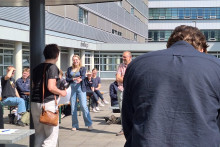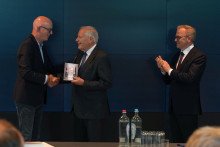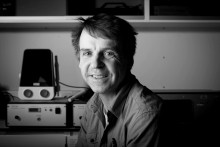Notably, the core research focus of the group is on composite materials, produced from two or more raw materials to combine the advantages of the individual constituents, although there are ongoing projects dealing with metals and plastics as well. Composites are in high demand in the aerospace industry and Formula One racing - to name but a few of the indirect benefiters of the group’s research efforts.
This spring, the research group was jointly awarded four million euros by the province of Overijssel and the European Regional Development Fund, with an additional four million euros provided by a consortium of companies. This will no doubt be a shot in the arm for Professor Remko Akkerman, the chairholder of the group whose belief that ‘Mankind has to reduce energy consumption’ is guiding the way for innovations in thermoplastic composite technology.
Guest contributor Ashok Sridhar, who will defend his final thesis today, talks with Professor Akkerman about what drives his research group to fly sky-high, earning awards and working closely with leaders in private industry and academia.
Your group has been expanding quite rapidly in the past few years. This means more projects and more responsibilities. What keeps you going?
‘The expansion is thanks to a growth in external funding. Apparently we are doing things that matter to our surrounding, helping society and industry. Our research is right at the center of IMPACT (Institute of Mechanics, Processes and Control Twente) and typical for our university. I would say we are at the interface between technology and society. Who would stop if the things you have been building up are so much in fashion and widely appreciated?’
Recently you were granted a project with a sizable budget. Could you reveal some specific details about the same?
‘Indeed, we have eight million euros for the ThermoPlastic Composite Research Center (TPRC). Ten Cate, Fokker, Boeing and UT are the founders of this open innovation center, investigating issues concerning design, production and materials at low Technology Readiness Levels. We observe a rapid growth in the new composite materials, the behavior of which is still relatively unknown, especially during the production phase. Once again, we are doing things that matter. Mankind has to reduce energy consumption, for which we need lighter constructions and hence lighter structural materials for mass market applications. Thermoplastic composites have the potential to satisfy this need. Hence the aerospace industry has a huge interest in them. In the years to come, we expect many new members at the center, most interesting as well as challenging research, and relevant innovations in thermoplastic composite technology.’
There are people from various social and cultural backgrounds in your group. Could you summarize briefly if there are differences in managing such a group when compared to an all-Dutch group?
‘All our communication is culturally biased. Recognizing this makes you more aware, inducing you to make your choices more consciously and to communicate in a more explicit manner. In other words, making less sub-conscious decisions and using less implicit communication then you would be inclined to in an environment with only native citizens .’
In the past couple of years, the members of your group won a number of awards. Can you single out one or two reasons for this success?
‘Subjects relevant to the society are self-explanatory and are easily appreciated. Secondly, our group has this positive critical atmosphere, and we are pretty critical on our communication to the outside world, where we may have achieved some sort of a high standard. Finally, our master’s and PhD students apparently have the level to do these things right. Awards cannot be won without the proper content.’
Where do you see yourself and your group in, let’s say, five years from now?
‘Hopefully, we are able to keep the atmosphere of multicultural fun and open-minded positive criticism. We should have further improved our international recognition, and will continue to play and renew our role in the education of engineers. At the end of the day, this is probably the most relevant reason for the existence of our faculty. No matter how many million euros of research contracts or how many scientific awards we win, what matters most to important stakeholders is the supply of well educated, young people who are qualified with an academic degree.’
 |
| Sky is the limit: Professor Akkerman (front row, fourth from the right) and his team of achievers look ahead to future challenges. (Foto: Gijs van Ouwerkerk) |
Reaping innovations rewards
Over the years, the stellar progress and academic performance of the Product Technology Research group has been not just measured in quantitative terms, but also qualitative, as indicated by several awards and prizes won by its members.
Best Master’s Thesis Award was won for two years in a row by students within the CTW Faculty. Wouter Grouve (2007) and Johan van Ravenhorst (2008)
Corus Young Talent Prize given out by the Royal Holland Society of Sciences and Humanities for the best master’s thesis in the Netherlands. Ted Ooijevaar (2009)
Best Author Award presented at the Printing Future Days Conference, held in Chemnitz, Germany. Ashok Sridhar (2009)
Best Presentation Award given out at the Academic Network Event is organized by the European Gas Research Group based in Brussels. Roy Visser (2009)







